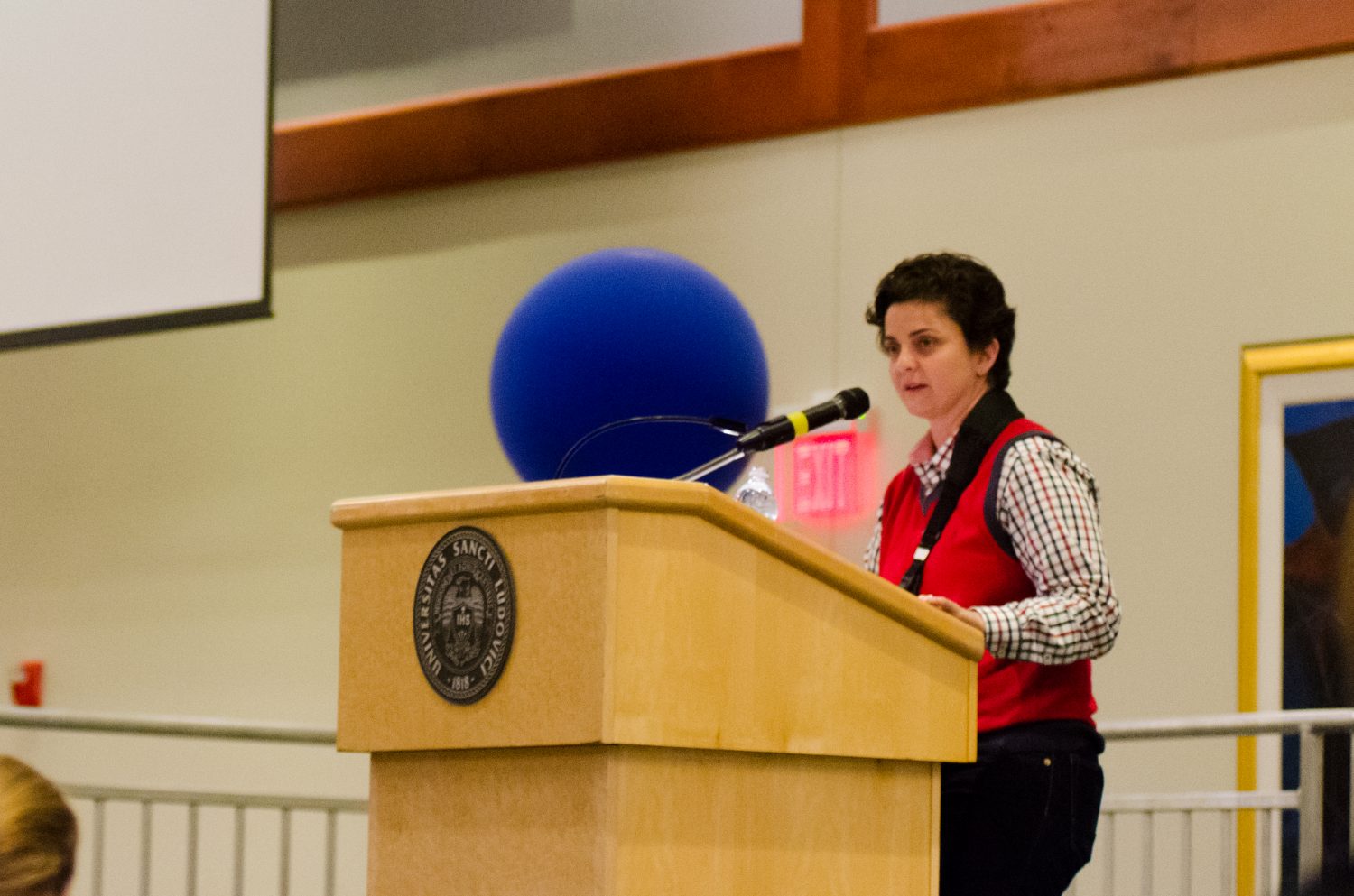Following the distinguished Fr. Greg Boyle, from the 2013 summer reading book “Tattoos on the Heart,” Luma Mufleh continues in the summer reading progam’s tradition to inspire an expansive care for humanity and advocate for a life lived in service to others. In the 2015 summer reading book, “Outcasts United,” English journalist Warren St. John spends a soccer season following the inspiring coach, mentor and teacher of Atlanta’s child refugee population, Luma Mufleh. The coach herself joined the St. Louis Community to speak about her work on Oct. 22.
It is clear that Luma Mufleh believes in the ability of one person to make a difference, even in the face of extreme opposition. In Mufleh’s own words, she is a gay, Muslim, and Arab woman—a combination of factors that led her to seek asylum in the United States after completing her degree at Smith College in Boston. Through this experience, her family disowned her, leading to her own experiences of isolation in a strange land. She was presented with the opportunity to create community out of the isolation of another group of individuals, however, and she seized it. One day while she was out grocery shopping in 2006, Mufleh came across a group of middle-school refugee boys gathered together to play soccer. Recognizing their shared passion for the game itself, she asked to play, and thus began an unexpected transformation in Mufleh’s life. Mufleh became the boys’ coach by default and their mentor by choice. She has responded to the needs of these boys and their families in a myriad of ways: from shuttling boys to and from soccer practice so they are able to participate in extra-curricular activities otherwise not available to them, assisting them with homework, and allowing the families to stay at her home for a few nights when a refugee family is evicted from their own home. Beginning with the creation of the Fugees Family soccer team within her first year of meeting the refugee boys in 2006, the needs of the community and Mufleh’s dedication culminated in the creation of the Fugees Academy. This is a co-ed middle and high school, particularly focused on the needs of refugee children—which will graduate its first high school class in 2016. Despite widespread political slander against her school and the many struggles to keep it financially soluble, she has persevered for the children she works with.
Mufleh did not set out to create a soccer team and school, but experiencing the needs of the refugee community, she decided it was within her ability to make a change. Mufleh recognized the difficulties and the prejudices parents of these children encountered when seeking employment and saw firsthand the impediments that made it impossible for children of refugees to succeed in school. When refugee children arrive in the United States, they are enrolled in the grade that corresponds to their age — regardless of if they are able to speak, let alone write, in the English language. The lack of resources to help them achieve mastery frequently leads to extreme isolation, acting out in school, and the continued loss of self-esteem. Already, these children must endure abandoning all that is familiar to them due to war and conflict, and must adjust to the life and culture of the United States. Fugees Academy offers a space where child refugees can have the necessary attention and dedicated curriculum that not only allows them to read and write effectively, but also have a community of support with other refugees and teachers who care about them and their success.
Luma Mufleh’s story offers much in the way of advice for individuals seeking to make a difference in the community. She cautions that although a college degree will give you education, it cannot give you the answers that a community needs. The community that individuals enter into is the main source of knowledge; and so, it is necessary to recognize that the individuals who have the least power in a situation also have the most knowledge of how their problem can be solved. In Mufleh’s own life, she listened to the communities she was interacting with, and even went to live with them to gain the full perspective of their lives and challenges. In thinking about how to be men and women for others, as the Jesuit values compel our SLU community to do, it is necessary that the ideas of those whom we serve are put before our own ideas of what is best for them.






